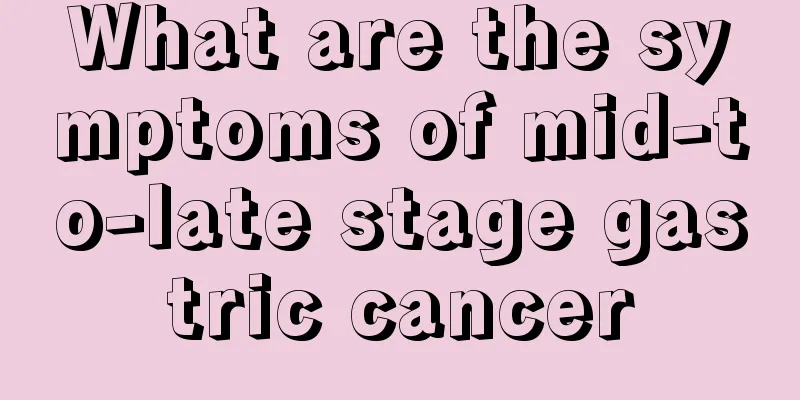What are the symptoms of mid-to-late stage gastric cancer

|
What are the symptoms of mid-to-late stage gastric cancer? Under normal circumstances, mid-stage gastric cancer may have symptoms such as weight loss, vomiting, abdominal pain, etc., and late-stage gastric cancer may have symptoms such as vomiting blood, black stools, and difficulty swallowing. Patients are advised to actively seek treatment. 1. Symptoms of mid-stage gastric cancer 1. Weight loss: At this time, the patient's gastric function is usually weakened, the digestion and absorption of food will be hindered, and the patient may not be able to absorb enough nutrients, leading to weight loss. 2. Vomiting: After cancer cells damage the digestive tract, the patient may have indigestion, which may be accompanied by vomiting and bad breath. 3. Abdominal pain: Local mucosal tissue may be necrotic after damage, causing abdominal pain, which may manifest as dull pain, hidden pain, sharp pain and other discomforts. Symptoms of Advanced Gastric Cancer 1. Vomiting blood: When gastric cancer enters the late stage, the damage to the digestive tract worsens, which can cause vomiting blood, which usually manifests as a jet-like state and the attack can be paroxysmal. 2. Black stools: When local mucosal necrosis increases, patients are prone to black stools, which may also contain mucus. 3. Difficulty in swallowing: When cancer cells spread further, they may compress the esophagus and cause difficulty in swallowing. At this time, the secretion of gastric acid may increase significantly, which can easily damage the gastric mucosa. In addition to the relatively common symptoms mentioned above, there are other possible symptoms, such as patients with mid-stage gastric cancer may have symptoms such as acid reflux, anorexia, anemia, etc., and patients with advanced gastric cancer may have symptoms such as heartburn, radiating pain in the back, and difficulty eating. It is recommended that patients actively seek medical treatment and follow the doctor's advice to treat with total gastrectomy and partial gastrectomy. |
<<: Is nasopharyngeal cancer contagious? What causes it?
>>: What to do if the mouth becomes crooked after treatment of nasopharyngeal cancer
Recommend
What medicine to use for pemphigus
Pemphigus, like systemic lupus erythematosus, is ...
What is the difference between Danshen dripping pills and Danshen tablets
In today's society, people's living stand...
How to take care of calcified thyroid nodules
The thyroid gland is a very important endocrine g...
Is breast cancer hereditary if you get it at the age of 40?
Although breast cancer has certain genetic factor...
A review of tongue cancer treatment methods
Tongue cancer is not common in life, so it is not...
How to fry coix seed?
The nutritional value of coix seed is recognized....
Authentic recipe for stir-fried eggplant with soy sauce
Stir-fried eggplant with soybean sauce is a commo...
Sweating on the upper body while soaking your feet is a sign of Qi deficiency
Foot soaking is a favorite choice of many people....
Is copper sulfate pentahydrate a pure substance?
Copper sulfate pentahydrate is a chemical substan...
What is the reason for weakness and numbness in the limbs
In traditional Chinese medicine, weakness and num...
Malignant prostate cancer is not a “death sentence”
Lao Gao is over 80 years old this year. Although ...
Are esophageal cancer and laryngeal cancer contagious?
Are esophageal cancer and laryngeal cancer contag...
What are the benefits of washing your face with mulberry leaf water
Facial beauty is very important for women. Some a...
Liver and lung dysfunction
The liver and lungs are two of the more important...
Can red wine and walnuts be eaten together
Walnut is a kind of nut food that we often eat. T...









